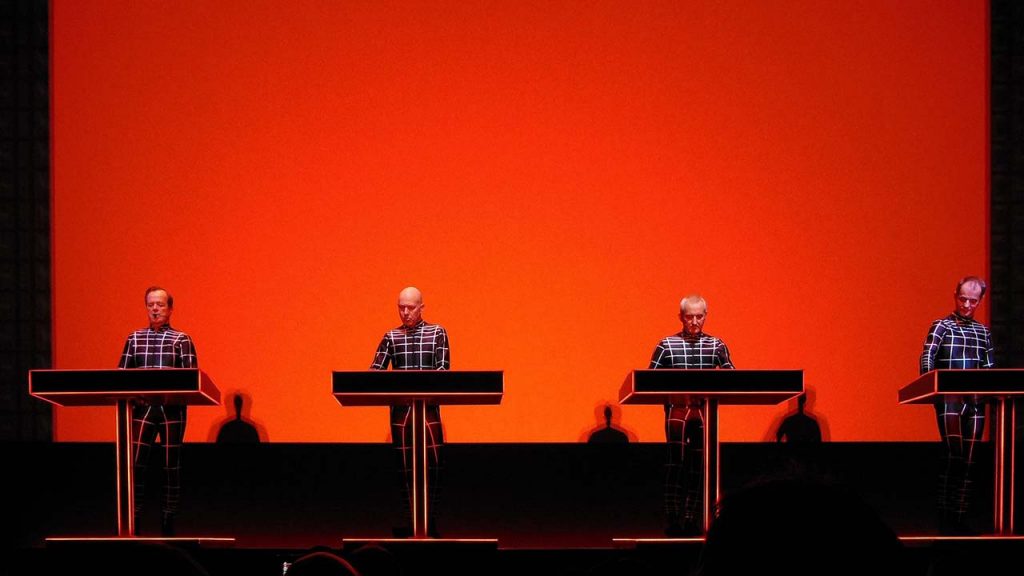Groundbreaking Quartet Kraftwerk Forever Revolutionized Electronic Music
Listen to 5 essential tracks from the iconic electronic quartet.

Spawned from the late 1960s German experimental music community, Kraftwerk was formed in Dusseldorf, West Germany, in 1970 by Ralf Hütter and Florian Schneider. At the time of its inception, it was a free-form experimental rock band exploring musical improvisations through a variety of instruments most notably guitar, bass, drums, organ and flute.
Hütter and Schneider performed as a duo using pre-set electronic drum patterns atop Schneider’s flute and guitar and Hütter’s keyboard sounds. They adopted the name Kraftwerk, meaning “power plant,” and described themselves as sound chemists, immersing themselves in sounds that reflected emerging new technology.
The pair released two albums, 1970’s Kraftwerk and 1972’s Kraftwerk 2 and supported the releases with intimate performances around Germany and France. With the release of their album Ralf and Florian, the group started incorporating vocoder for the first time. Wolfgang Flür joined in 1973 as the group began to focus on a more electronic sound as a trio. Karl Bartos rounded out the group when he joined the band in 1976.
Kraftwerk’s musical footprint can been seen in such synth-pop and eclectic music luminaries as Depeche Mode, Aphex Twin, Daft Punk and more. The group has also had a heavy influence on techno and drum and bass, including artists such as Juan Atkins, Kevin Saunderson and Carl Craig.
Kraftwerk is widely regarded as the forefathers of electronic music. They radically shifted the parameters of pop music and informed most of its trends in the late 20th century by staying well ahead of the curve with a boundary-defying sound that inspired a legion of synth-pop disciples.
Listen to 5 essential tracks from Kraftwerk:
1. “Autobahn”
1974’s album release Autobahn is when Kraftwerk began incorporating the Minimoog synthesizer and settle into its completely electronic vibe. Autobahn was a commercial success. It peaked at No. 5 on the charts, fueled by its title cut.
2. “Trans Europe Express”
Shortly afterward the release of Autobahn, the group expanded to a quartet with the addition of Karl Bartos, who further galvanized their electronic excursions on the 1976 album Radioactivity. Kraftwerk went on a prolific run by adopting an experimental “pop robot” sound that melded lush electronic pop melodies, infectiously hypnotic rhythms with strategically sparse and stylized minimalist arrangements. The quartet adopted matching suits based on computer and robot themes. With their sound and visual aesthetic completely in place, they released 1977’s Trans-Europe Express.
3. “Numbers/Computer World”
Following Trans-Europe Express, work began on what would be the group’s magnum opus — a meditation on the new global dominance of technology. 1981’s Computer World is a timeless music offering exemplifying electronic funk at its finest. The album has had a heavy influence on hip-hop and b-boy archetypes in subsequent decades.
4. “Tour De France”
The quartet went on the road on the Computer World Tour, bringing their Kling Klang studio on the road with them. They developed their signature live performance setup where they used live visuals such as back-projected slides and films synchronized with the music as well as hand-held miniaturized instruments during the set. They also famously used replica mannequins of themselves to perform certain sets like “The Robots,” and publicly portrayed themselves as automatons.
The Computer World tour was physically demanding, so the group stayed in shape by bicycling. They recorded a track inspired by one of Europe’s most popular cycling competitions, complete with sounds that followed the theme of bicycling — chains, gear mechanisms and the heavy breathing of the cyclist.
5. “Musique Non Stop”
With their status solidified as pioneers and trailblazers in the global electronic music community, Kraftwerk took time off from touring to focus on the production of tracks that would evolve into 1986’s Electric Café. By this time, the group’s influence could be seen in pop music as it was now dominated by synthesizers and drum machines. They released The Mix in 1991 and in 2003 the Tour De France Soundtracks. They were recognized with Grammy Awards capped by a Lifetime Achievement Award in 2014 and were inducted into the Rock n’ Roll Hall of Fame in 2021.
Trusted, accurate, up-to-date.
WDET strives to make our journalism accessible to everyone. As a public media institution, we maintain our journalistic integrity through independent support from readers like you. If you value WDET as your source of news, music and conversation, please make a gift today.
